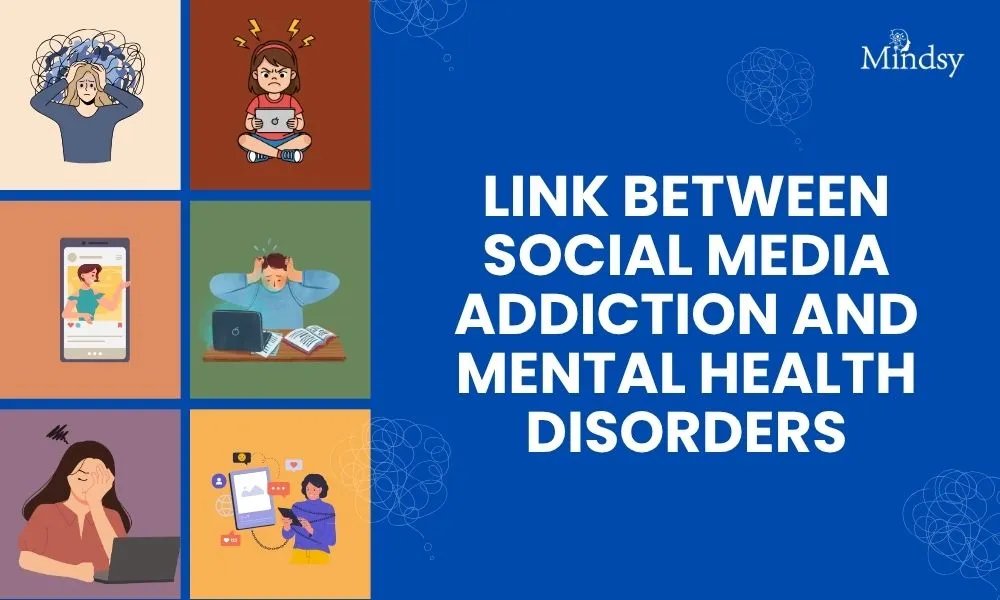The Link Between Social Media Addiction and Mental Health Disorders

In today’s world, scrolling through social media is routine for billions—over 5.2 billion people globally use these platforms. While staying connected is easy, research reports that 210 million people (nearly 4.7% of all users) are now addicted to social media. Which is the main cause of disrupting sleep, increasing stress and worsening symptoms of anxiety and mood disorders.
When Social Media Use Turns Into Addiction?
Checking notifications, likes or messages may feel harmless, but for 42% of teens, the compulsion to keep checking is a sign of deeper digital dependency which also keeps them from connecting with friends in person. Studies show the average young adult checks their phone over 150 times daily, with up to 40% of those aged 18-22 in the U.S. reporting addiction-like behavior. Over time, this dependency can cause emotional fatigue, irritability and difficulty focusing on real-life tasks and relationships
How Social Media Impacts Mental Health?
The link between social media and mental health lies in how digital engagement shapes emotions. Constant comparison with others’ achievements or appearances often leads to self-doubt and low self-esteem. Exposure to negative news or online bullying further heightens anxiety and stress, eventually impacting mental stability and emotional regulation.
Signs You Might Be Addicted to Social Media
Some warning signs include:
- Checking apps within minutes of waking up or before sleeping
- Feeling restless when not online
- Spending hours scrolling without purpose
- Neglecting work, studies, or social commitments
- Experiencing mood changes based on online feedback
Recognizing these patterns early helps prevent long-term mental health challenges.
The Connection with Major Depressive Disorder
Research has found a close relationship between social media addiction and major depressive disorder. Constant online engagement can trigger loneliness and a fear of missing out (FOMO), which over time deepens emotional distress. Those already prone to depression may experience worsening symptoms due to unhealthy online habits and disrupted daily routines.
Why Digital Addiction Feeds Anxiety?
Digital overload keeps the brain in a constant state of stimulation. The continuous stream of notifications and updates increases pressure to respond instantly, heightening anxiety levels. This cycle can make it difficult to relax, concentrate or feel mentally present in day-to-day life, contributing to chronic stress.
Impact on Sleep and Cognitive Health
Late-night scrolling interferes with natural sleep cycles. Blue light from screens suppresses melatonin production, leading to poor sleep quality and fatigue. Over time, lack of rest affects memory, attention span and emotional balance, creating a cycle that worsens both digital addiction and mental health disorders.
How Social Media Shapes Self-Image?
Filters, curated posts and influencer lifestyles create unrealistic beauty and success standards. Continuous exposure makes users feel inadequate or pressured to match online perfection. This distorted self-image can affect confidence, increase body dissatisfaction and lead to emotional withdrawal or obsessive behavior around digital validation.
Steps to Build a Healthier Digital Routine
Breaking free from social media addiction starts with simple, mindful changes:
- Set screen-time limits using mobile tracking tools
- Schedule tech-free hours daily
- Unfollow accounts that trigger comparison or stress
- Engage more in offline hobbies and exercise
- Prioritize face-to-face conversations for genuine connection.
These small shifts can reduce digital stress and rebuild mental balance.
When to Seek Professional Help?
If online habits begin to affect sleep, relationships or work performance, professional support may be necessary. A mental health expert can assess how social media and mental health are connected in an individual’s life and create a personalized plan for recovery and emotional regulation.
How Mindsy Can Help?
Mindsy connects individuals with clinical psychologists who understand the effects of social media addiction and digital life stress. Through online consultations and structured therapy, professionals guide users in setting digital boundaries, improving focus and managing anxiety linked to online behavior.
Mindsy’s therapy programs also support those dealing with major dissociative disorders, helping them rebuild confidence and establish a healthier relationship with technology. With flexible sessions available through the app, individuals can receive timely guidance, track progress and regain control over their emotional well-being-one mindful step at a time.
FAQ’S
1. What is social media addiction?
Social media addiction is a behavioral condition where individuals compulsively use online platforms, often losing control over their screen time. It leads to emotional dependency, disrupted routines and negative effects on mental health, relationships, and productivity.
2. How does social media addiction affect mental health?
Excessive use of social media increases anxiety, loneliness and low self-esteem. Comparing oneself with others online or seeking constant validation can trigger emotional stress, contributing to mental health disorders such as anxiety and mood imbalances.
3. Can social media addiction cause depression?
While social media doesn’t directly cause depression, studies show that overuse can worsen symptoms in people vulnerable to major depressive disorder. Constant comparison, isolation and digital fatigue increase emotional distress and feelings of inadequacy.
4. What are the warning signs of social media addiction?
Common signs include checking apps frequently, restlessness without access, loss of focus, neglecting responsibilities and mood swings tied to online feedback. These behaviors indicate digital addiction that may affect emotional balance and daily functioning.
5. How can someone break free from social media addiction?
Start by setting screen-time limits, turning off notifications, and taking regular digital breaks. Engage in offline hobbies, physical activity and real-life conversations. Seeking therapy for social media and mental health challenges can help rebuild control and awareness.
